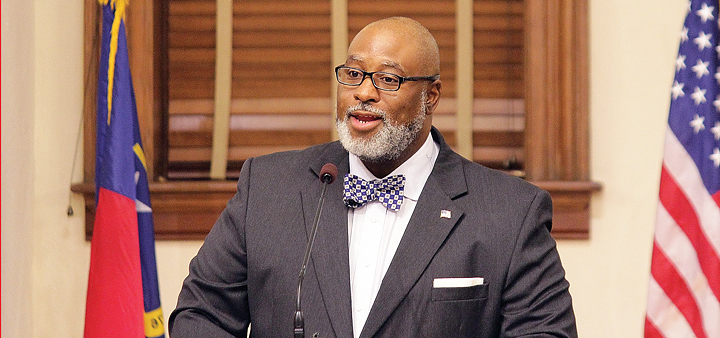Concerns about county spending and county debt divided the New Hanover County Commissioners Feb. 2, both during a State of the County address outlining the board’s past efforts and future plans to direct growth and foster economic development, and during a subsequent discussion about the county travel policy.
More than 100 citizens and elected officials gathered in the New Hanover County Historic Courthouse for the address, delivered by chairman Jonathan Barfield, Jr., before the board’s regularly scheduled meeting. Barfield recalled changes the area has undergone in his lifetime, reflected on planning initiatives and economic incentives approved by the county in the recent past, and called for increased investment in education as an investment in future economic development.
County spending and swelling county debt should have been discussed in the address, said commissioner and past chairman Woody White in a statement released earlier in the day Feb. 2, preceding the address. White plans to discuss the issues he finds important to the future of the county in a videoed response to be released on the county website later this week.
Barfield was not receptive to his suggestions to discuss county debt and spending during the address, White said.
“The State of the County, in my opinion, ought to reflect the viewpoint of all five commissioners, and adequately seek input from those commissioners about what our future challenges are and how we’re going to meet them,” White said.
Barfield did note White’s effort to trim county spending and revamp the county’s debt policy during his address.
“It was under the leadership of then chairman Woody White, who indeed forged a way with his vision and leadership to indeed encourage our county to adopt a debt policy, and Woody, we honor you for that,” Barfield said.
Barfield worked with county staff to craft the address, he said. He cited his six years of experience on the board, arguing that past chairmen did not seek input from fellow commissioners or share drafts before delivering the address. While White declined the opportunity to deliver an address as chairman in 2014, Barfield viewed his effort as a restoration of tradition and an opportunity for citizens to witness leadership in county government.
“That’s not the history of county government, and unfortunately, some folks that have been here not as long as I have don’t fully understand the history of this great organization. What I did tonight is restore history and tradition back to county government,” Barfield said.
State of the County addresses were delivered annually by board chairmen since 2006, with the exception of 2014 under White’s leadership. White said he did not deliver an address last year because he viewed it as an unnecessary expense.
“Last year, I opted not to incur the expense of having a speech like this,” White said. He cited the cost the county assumed to mail printed invitations for the event and host a catered reception afterward as examples of unnecessary spending. The county paid $1,016 for the catering, said county spokesperson Charles Smith, and about $30 for postage. Smith confirmed that receptions followed past addresses, but said county staff was unable to determine what was provided at past receptions and how much it cost.
White said he also declined the opportunity to deliver an address in 2014 because he felt it directed an unfair portion of the spotlight on one person. In 2013, under White’s leadership, all five members of the board were welcome to discuss priorities in a digitally broadcasted address.
“I just felt like it called too much attention to one commissioner, so I didn’t feel comfortable with that,” he said.
Squabbles and disagreements emerging from the newly seated board prevent the officials from fully fulfilling their duties, Barfield said.
“At the local level, there’s no need to have partisan politics. We are here to serve the people,” Barfield said. “. . . Hopefully moving forward, we can speak with one voice, put the partisan stuff aside, and make sure we are representing the needs and the citizens of New Hanover County totally.”
Commissioners not formally governed by county travel policy
At the end of the board’s meeting, White proposed a motion to subject the board to an updated travel policy for county employees. The new policy, which county management plans to implement in the next 30 days, modifies per diem spending to reflect regional differences in costs, as outlined by the General Services Administration.
Because White has “never gone to any of these conferences,” Barfield said he does not know the circumstances that sometimes prevent commissioners from staying within the confines of the county travel policy.
Like Barfield, Commissioner Rob Zapple said he will voluntarily adopt the new travel policy, but said it benefits the county to not formally subject the board to the policy and provide flexibility for future commissioners who need more financial assistance to attend conferences.
Commissioner Skip Watkins also pledged to voluntarily subject himself to the policy, which he pointed out does include flexibility to reimburse spending that exceeds the per diem on a case-by-case basis, but said formally adopting the policy would send a message to citizens and county employees.
“I will do it voluntarily, whether this body adopts it or not, but I just think it’s nice for the people to know where we stand,” Watkins said.
The motion failed 2-3, with White and Watkins supporting it.
email [email protected]




